|
|
|
Sort Order |
|
|
|
Items / Page
|
|
|
|
|
|
|
| Srl | Item |
| 1 |
ID:
146231
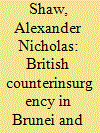

|
|
|
|
|
| Summary/Abstract |
This paper uses recently-released material from the ‘migrated archives’ to provide an original counterinsurgency analysis of the TNKU revolt in Brunei and Sarawak from December 1962 to May 1963. It argues that, despite a failure to act upon intelligence predicting the outbreak of insurgency, Britain developed a highly effective counterinsurgency organisation. These records also indicate that decision-makers drew inspiration from the Malayan Emergency to inform success in Brunei. Although Malaya has been challenged as a counterinsurgency paradigm, the Brunei operations show the utility of striking a balance between inappropriately copying from past campaigns and developing best practices applicable to the unique environment of Borneo. In turn, the evolution of effective operational practices in Brunei informed their successful application to the subsequent Indonesian Confrontation.
|
|
|
|
|
|
|
|
|
|
|
|
|
|
|
|
| 2 |
ID:
146228
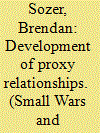

|
|
|
|
|
| Summary/Abstract |
Proxy warfare is a consistent element in international warfare. However, it is unclear why proxy relationships form in cases where states have multiple options of groups to support. Existing research identifies the presence of transnational constituencies, shared interstate rivalries, and moderate relative strength of militant groups as highly influential on the development of a proxy relationship. This study examines the presence of these variables within the context of the Lebanese Civil War. The results of this demonstrate that each state places greater importance on some variables and ignores others when choosing a proxy. Additionally, this study further demonstrates the presence of new variables that are key to the development of proxy relationships.
|
|
|
|
|
|
|
|
|
|
|
|
|
|
|
|
| 3 |
ID:
146226
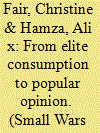

|
|
|
|
|
| Summary/Abstract |
The United States has conducted armed drone strikes in Pakistan since 2004. While there has been some recent work on Pakistani public opinion about drones, there is very little research on how Pakistan’s media characterize the US drone program. This is an important gap in understanding the determinants of Pakistani popular perceptions of this program. Decades of research has shown that “news framing”, a process by which certain aspects of a complex concept are emphasized in political communications with others played down, influences individual cognition while forming political opinions. In this essay, we address this lacuna by assembling an unprecedented sample of editorials about the drone program from three English newspapers and one Urdu newspaper and analyzing the news frames within them. We next compare the trends in these news frames to public opinion data collected by Pew between the spring of 2009 and 2014. Initially, most Pakistanis were unaware of the drone program, media coverage of the program expanded as drone strikes increased in frequency. While Pakistanis became more cognizant of the US drone strikes, even by 2014 large minorities remained unaware. Pakistani public opinion strongly reflected the top media frames, particularly those that are negative. This is an important finding suggesting that newspaper editorials are a good barometer of Pakistani opinions despite the fact that only information elites rely upon newspapers for political information.
|
|
|
|
|
|
|
|
|
|
|
|
|
|
|
|
| 4 |
ID:
146225
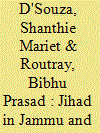

|
|
|
|
|
| Summary/Abstract |
Militant jihad as witnessed in Jammu and Kashmir (J&K) is centred around the primary objective of finding a separate homeland for the Muslims of the state. Opinion on whether this homeland would be an independent entity or merged into Pakistan remains inconclusive. And yet, this externally sponsored violent extremism, spearheaded by interlinked militant formations with significant local participation, has remained deeply religious, highlighting the alleged machinations of the Hindu Indians, both in the state and in India in general, against the Muslim population. Over the years, the objective of liberating Kashmir from Indian control has been attempted not just through an armed movement that targets the symbols of Indian state sovereignty within J&K, but has invested resources carrying violence into the Indian heartland and also making the movement transnational in character by aligning with global terror formations like the al Qaeda and the Islamic State. This paper is an examination of the shifting agenda as well as the activities of three primary militant formations operating in J&K: the Hizb-ul-Mujahideen, the Lashkar-e-Toiba and the Jaish-e-Mohammad and an assessment of the transformation of the Jihad that has bilateral, regional and international security implications.
|
|
|
|
|
|
|
|
|
|
|
|
|
|
|
|
| 5 |
ID:
146230


|
|
|
|
|
| Summary/Abstract |
Since control over the population constitutes the most crucial determinant for victory in irregular warfare, how should a state authority isolate the insurgents (the “fish” in Maoist terms) from the population (the “sea” in which the “fish” thrive)? Should a state authority simply drain the “sea” by diverting its “water” elsewhere? Does the forcible transfer of the local people who support an insurgency truly work? This article studies how the royalist regime of Greece forcibly transferred thousands of villagers (over 10% of the total population) to counter the communist insurgency during the Greek Civil War (1946–1949) and shows whether and how these deportations could be crowned with success.
|
|
|
|
|
|
|
|
|
|
|
|
|
|
|
|
| 6 |
ID:
146227


|
|
|
|
|
| Summary/Abstract |
Experiences from the end of the Provisional Irish Republican Army’s campaign of armed violence have informed broader debates on how terrorism ends, yet this research has underplayed the internal dynamics which made the IRA’s disengagement successful. The article utilises a framing approach to explain how a network within the IRA managed to ensure the majority of the movement supported an end to violence. A disengagement frame was constructed by this network within the IRA which maintained narrative fidelity, it utilised the credibility of mid-ranking commanders, and there were sufficient linkages to diffuse the frame due to generational hegemony, the structure of the IRA, and the unique structure of the prisons system. Finally, the article challenges the utility of decapitation strategies because organisational stability can maintain the components which ensure a disengagement frame will resonate.
|
|
|
|
|
|
|
|
|
|
|
|
|
|
|
|
| 7 |
ID:
146229
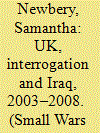

|
|
|
|
|
| Summary/Abstract |
The UK’s interrogation operations during the conflict in Iraq (2003–2008) are often portrayed by the media as involving significant amounts of mistreatment. This article demonstrates that these practices are not necessarily representative of the UK’s interrogation operations across this conflict. In doing so it contributes to the limited literature on the practice of interrogation and on the UK’s combat operations in Iraq. The UK’s interrogation capability, and therefore its intelligence-gathering capability, is shown to have rested primarily with the military’s Joint Forward Interrogation Team (JFIT). The JFIT suffered from limitations to the number, training and experience of its interrogators and interpreters. It is argued that maintaining a permanent, higher level of preparedness for interrogation by the British armed forces is desirable.
|
|
|
|
|
|
|
|
|
|
|
|
|
|
|
|
|
|
|
|
|